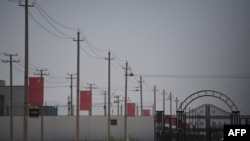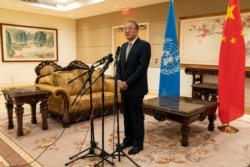Western diplomats at the United Nations criticized China for its human rights abuses against ethnic Uighur Muslims and its crackdown on Hong Kong's autonomy Tuesday, while Beijing hit back, focusing its anger on the United States.
"We call on China to respect human rights, particularly the rights of persons belonging to religious and ethnic minorities, especially in Xinjiang and Tibet," German Ambassador Christoph Heusgen said on behalf of 39 countries at the U.N committee that deals with human rights issues.
Xinjiang is the province in northwestern China where the government has detained as many as a million Uighurs in so-called "re-education" camps in recent years.
He went on to express grave concern about the increasing number of reports of gross human rights violations there.
"There are severe restrictions on freedom of religion or belief and the freedoms of movement, association, and expression as well as on Uighur culture," said Heusgen. "Widespread surveillance disproportionately continues to target Uighurs and other minorities, and more reports are emerging of forced labor and forced birth control, including sterilization."
Speaking to reporters after the meeting, Heusgen called on Beijing to close the detention camps.
He noted that last year, 23 countries joined the condemnation of China on the Uighur issue, and the near doubling of countries this year signaled that there is growing international concern about Beijing's policy toward the ethnic minority.
Heusgen was joined by British envoy Jonathan Allen, who said that China must grant U.N. High Commissioner for Human Rights Michelle Bachelet's long-standing request to visit Xinjiang to see the situation of the Uighurs.
Allen also condemned China's imposition on June 30 of a controversial security law that he said "violates Hong Kong's autonomy, and threatens rights and freedoms."
Imposition of the law set off months of anti-government protests in Hong Kong.
China's ambassador, Zhang Jun, hit back, targeting the United States. Without addressing the Uighur issue, he claimed China's human rights achievements are "widely recognized" and he urged Washington to "take a good look in the mirror" and eliminate racial discrimination in its own society before attacking other countries.
"Millions of Americans have cried out 'I can't breathe' and 'Black lives matter,'" the envoy said, referencing recent calls of protesters in the U.S. demanding an end to decades of racial discrimination and injustice in the aftermath of the death in police custody of an African American man, George Floyd, in May.
Zhang also hit out at President Donald Trump's repeated accusations that the coronavirus pandemic originated in China and that Beijing is responsible for its global spread.
"What the U.S. government needs is treating the sick and saving lives, not spreading the political virus and making troubles everywhere," the Chinese envoy said.
China did receive support from more than 50 countries, including Iran, North Korea, Syria and Venezuela, for its authority over Hong Kong, while some 45 countries signed on to a statement delivered by Cuba, supporting Beijing's assertion that its measures in Xinjiang are part of counter-terrorism and deradicalization efforts. Diplomats said some other countries, including some Western ones, were pressured by China not to support the group of 39's statement.
The United States did not speak at the session but was part of the joint statement of 39 countries that Germany delivered.
U.S. envoy Kelly Craft tweeted out her concern, saying, "The situation in Xinjiang & recent developments in Hong Kong make clear that the PRC has outright contempt for its human rights obligations & the well-being of its citizens." PRC stands for the People's Republic of China.
Human Rights Watch said the statement by the 39 countries is a "stinging rebuke" of China's "brutal treatment of Uighurs, the people of Hong Kong and Tibet, and many ordinary Chinese struggling to have their human rights respected."
"Their growing outrage signals the urgent need for the U.N. leadership to create an international mechanism to monitor and report on the increasingly dire rights situation across China," U.N. Director Louis Charbonneau said.






